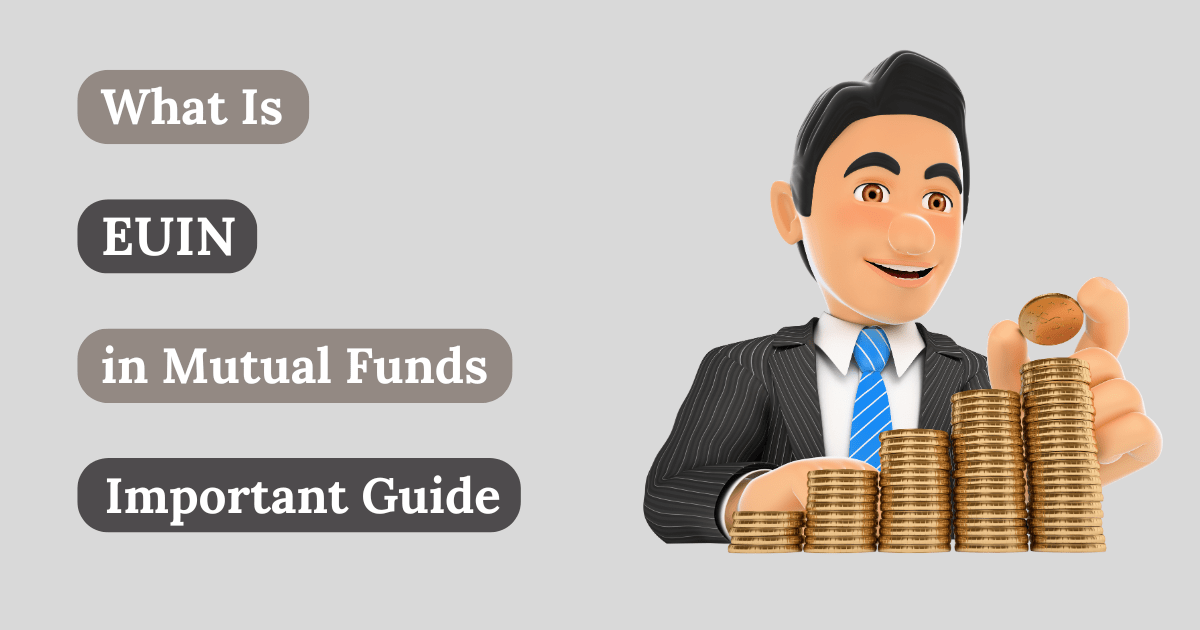When investing in mutual funds, you must understand all of the procedures and rules that protect your interests as an investor. One such rule is the Employee Unique Identification Number (EUIN).
If you’ve ever been approached by a mutual fund salesperson or advisor, you’ve probably heard this term. EUIN in Mutual Funds plays an important role in providing ethical financial activities, particularly in the connection between advisors and investors.
In this article, we will explain what an EUIN is, how it works, the benefits it provides investors, and why you should be aware of it before making any mutual fund purchases.

What is EUIN in Mutual Funds?
EUIN, or Employee Unique Identification Number, is a unique code assigned to individual workers, agents, and distributors that sell or advise on mutual fund products. SEBI (Securities and Exchange Board of India) introduced EUIN, which enhances transparency in mutual fund transactions by identifying the individual responsible for advising an investor. This number helps in tracking the role of the agent or advisor in the decision-making process, particularly when advisory or suggestive services are provided to the investor.
SEBI introduced EUIN to tackle illegal activities such as misselling mutual funds. Previously, some agents or distributors sold items only for larger commissions, frequently ignoring the investor’s needs or risk tolerance.
With EUIN, such activities can be more closely monitored and controlled. The creation of EUIN was a key step towards promoting responsible sales practices and holding advisors responsible for the quality of the advice they provide.
How Does EUIN Work in Mutual Funds?
The Association of Mutual Funds in India (AMFI) assigns EUINs to employees, agents, and distributors. Once assigned, it becomes an essential part of mutual fund transaction documentation, especially if the agent or distributor performs any advisory services.
Using EUIN in mutual funds approach ensures that each suggestion or sale is assigned to a single advisor, making the entire process more transparent.
Who Uses EUIN?
The EUIN is mandatory for:
- Mutual Fund Agents and Distributors
- Employees of Distributors
- Any other people who sell or suggest mutual funds to investors
Whether an investor is an experienced market participant or new to mutual funds, the EUIN helps ensure that the advice they receive is from a licensed, responsible person. It is also important to track or investigate any issues or complaints that may occur after the transaction.
Benefits of EUIN for Investors
EUIN in mutual funds provides various benefits to investors, It protects them from unethical sales practices and mis-selling.
Ensures ethical selling practices:
One of the primary benefits of EUIN is that it promotes legal conduct in the mutual fund business. Because agents and advisers are aware that their actions are being recorded, they are less likely to promote products that match up with the investor’s objectives or financial needs. EUIN makes it easier to identify cases when advice may not have been in the investor’s best interests.
EUIN protects investors:
If there are any difficulties with the advice offered, such as the quality of the product suggested, the EUIN can help trace back the advisor’s role in the transaction. This visibility serves as an incentive to advisors, stopping them from engaging in misleading techniques.
Resolves Disputes
Another important benefit of EUIN is its use in solving problems. In situations where mis-selling may have occurred, the investor can refer to the EUIN number recorded in their transaction. SEBI or AMFI can then look into the incident and hold the responsible broker or distributor accountable. This streamlines conflict resolution and provides investors with an additional layer of security.
How to Verify EUIN in Mutual Fund Transactions?
EUIN in mutual funds offers investors several benefits, including protection against illegal sales methods and fraud. Investors have to make sure that the right EUIN will be used during transactions.
Here’s a step-by-step guide to verifying your EUIN when investing in a mutual fund.
Before submitting any investment, ask your advisor or agency for their EUIN. It should be clearly stated in all transaction-related documentation.
Check out AMFI’s website: AMFI has made it simple for investors to confirm the EUIN of their advisor or distributor. Simply go to the AMFI website and enter the EUIN to confirm the agent’s registration and validity.
Cross-check in Transaction Documents: When you receive the papers for your mutual fund investment, make sure the right EUIN is has been entered. This ensures the transaction’s transparency and identifies the responsible advisor.
Tools and Platforms to Verify EUIN: Aside from AMFI’s website, various other sites provide verification services. You can either contact the mutual fund company or use online transaction platforms that support EUIN verification as part of the investment process.
What Happens If EUIN is Not Used?
While an EUIN is required for mutual fund transactions, there are disadvantages if it is not used or ignored by either the investor or the agent.
For Investors:
If you invest in mutual funds without an EUIN, there is no record of the advisor or agent who gave you investment advice. This may lead to problems later on, particularly if there are disagreements about the legal advice collected. Without an EUIN, it is more difficult to identify the advisor’s role, which may delay the submission of a complaint or demand a solution.
For Agents and Advisors:
Agents and advisors who fail to use EUIN may face consequences and penalties from SEBI or AMFI. All distributors and agents must use EUIN in advised transactions, and failure may result in either the cancellation or suspension of their license to operate.
Common Mistakes About EUIN
There are various misunderstandings regarding EUIN, and it is important to clarify them so that investors receive accurate information.
Myth 1: The EUIN is only required for new investors.
This is one of the most popular myths. EUIN is necessary for all advising transactions, whether the investor is new to the market or has prior experience. The goal of the EUIN is to provide transparency in all transactions including guidance.
Myth 2: EUINs are only required for big investments.
Another myth is that EUIN is only needed for big projects. In reality, EUIN is required for all advising services, whatever the amount of investment. Whether you invest little or a large number, the advisor’s activity must be tracked using EUIN.
Conclusion
The Employee Unique Identification Number (EUIN) is an important tool in the mutual fund sector for maintaining transparency, accountability, and moral standards. Understanding how EUIN works and how it helps you as an investor allows you to make better judgments about mutual fund investments.
When doing transactions, always validate the EUIN and ensure that it is appropriately mentioned in your paperwork. EUIN in mutual funds not only protects your interests but also ensures that the advice you receive is open and responsible.
Investing in mutual funds needs proper research, and understanding EUIN is an essential component of that process. Keep these recommendations in mind to protect your financial future by understanding the role EUIN plays in your investment journey. If you want to invest money in Mutual Funds then you should also know about the RIA Code in Mutual Funds and the Lock-in Period of Mutual Funds. These terms also help you to improve your knowledge of Mutual Funds.
Frequently Asked Questions (FAQs)
1. What is the full form of EUIN in Mutual Funds?
The full form of EUIN is the Employee Unique Identification Number. Employees, agents, and distributors who offer advisory services on mutual fund transactions are assigned a unique code.
2. Why was EUIN introduced?
SEBI (Securities and Exchange Board of India) developed EUIN to promote transparency and responsibility in mutual fund transactions. It helps to track the activity of agents or advisors in promoting a specific mutual fund, so securing investors from misselling and illegal conduct.
3. Is EUIN mandatory for every mutual fund transaction?
EUINs are required for all mutual fund transactions that include advisory services. However, if the transaction is execution-only (with no guidance), EUIN may not be necessary. In all cases when guidance is provided, EUIN must be used.
4. How can investors check if the correct EUIN is being used?
Investors can verify the EUIN by contacting their agent or advisor directly and verifying the transaction documentation. Furthermore, EUIN can be validated on the AMFI (Association of Mutual Funds in India) website, where investors can double-check the validity of the number.
5. What if an agent refuses to provide an EUIN?
If an agent refuses to give an EUIN, this is a red flag to the investor. The investor should not proceed with the transaction without the EUIN, which is required to ensure the transparency and accountability of the advising service. In these types of situations, investors might consider reporting the incident to SEBI or AMFI.

